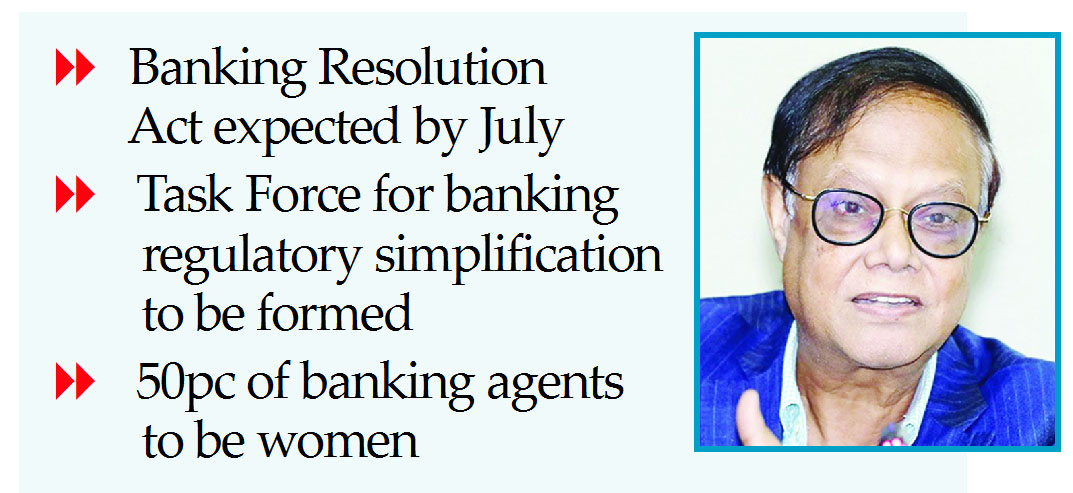No more ‘Sycophancy’ for foreign loans says Governor

Staff Reporter :
Bangladesh’s balance of payments (BoP) has seen a notable improvement, bolstered by a strong foreign savings position, removing the need to seek external loans through undue dependence, Bangladesh Bank Governor Ahsan H Mansur stated on Tuesday.
“We will not compromise. Our external financial position is now very strong,” he asserted during a roundtable discussion titled Path to Recovery for the Banking Sector, organised by The Business Standard at its office in the capital.
The governor projected that Bangladesh’s remittance income for the current fiscal year would reach approximately $29 billion.
Additionally, if export earnings reach $50 billion, the country would still maintain a surplus of $10 billion after covering import payments.
Despite this robust external financial position, Mansur highlighted sluggish bank deposit growth as a key concern. “Private sector savings are not increasing.
However, an improved balance of payments will support savings growth,” he explained.
He noted that the balance of payments, which had been negative under the previous government, is now in surplus.
“Our foreign savings have increased due to a positive current account balance. To further strengthen the financial sector, we need to attract more deposits from expatriates,” he added.
The governor stressed the need to focus on the private sector, particularly financial accounts, through mechanisms such as the stock market or offshore banking units.
“Banks can enhance cash flow and mobilise deposits via offshore banking. We must intensify efforts to attract deposits from non-resident Bangladeshis,” he said.
“If we can achieve this, our balance of payments will strengthen even further,” Mansur concluded.
The governor also announced that the long-awaited Banking Resolution Act is expected to be finalised by July 2025.
“At our current pace, we should be able to enact the Banking Resolution Act by July,” he stated at the roundtable.
When asked about the progress of banking sector reforms by December, Mansur responded, “The central bank’s structural reforms will be completed by July-August.
We will initiate reforms in the banking sector, but their long-term success will depend on the next elected government.”
He acknowledged the ambitious nature of the reform agenda but assured that efforts were progressing as swiftly as possible.
The Banking Resolution Act aims to establish a legal framework to address financial crises in Bangladesh’s banking sector.
It will enable swift policy decisions on mergers, acquisitions, liquidation, or recapitalisation of struggling banks, helping to prevent disruptions in the financial system and ensuring economic stability.
A key provision of the act is to grant Bangladesh Bank greater authority to restructure failing banks.
It also seeks to protect depositors and creditors by implementing a resolution framework to minimise risks, particularly for small account holders, in the event of a bank collapse.
By enhancing regulatory oversight and equipping the central bank with the necessary legal tools, the law is expected to restore confidence in the banking system.
Furthermore, it aims to improve governance, accountability, and transparency within the sector, fostering long-term financial stability.
To streamline banking operations, the central bank will establish a Banking Regulatory Simplification Task Force, Mansur announced at the roundtable.
The decision follows concerns raised by managing directors of several banks regarding the excessive number of regulatory reports required each month.
They also expressed frustration over frequent directives from the central bank, which they say have caused confusion and hindered timely decision-making.
The task force will comprise managing directors from various banks as well as financial experts.
During the discussion, the governor instructed Selim RF Hussain, chairman of the Association of Bankers, Bangladesh and managing director of BRAC Bank, to collaborate with other banking leaders and submit recommendations on regulatory simplification to the central bank.
Additionally, Bangladesh Bank is set to issue a circular mandating that at least 50 per cent of banking agents be women, a move aimed at promoting gender inclusivity in the sector.
